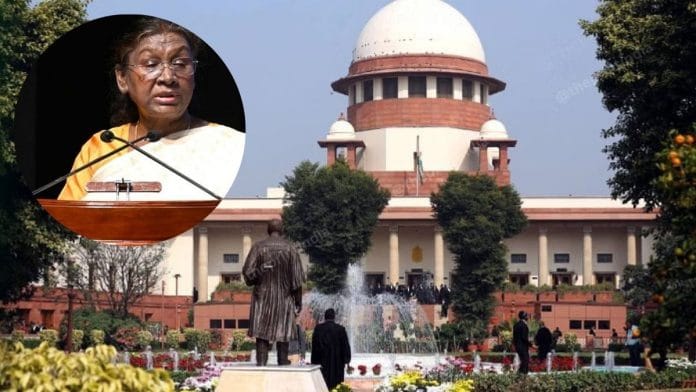New Delhi: Solicitor General Tushar Mehta told the Supreme Court Thursday that the President of India wanted the court’s opinion on whether states can file writ petitions under Article 32 of the Constitution for violation of fundamental rights, instead of Article 131, which gives the top court original jurisdiction over disputes between the Union and states.
Acting in its advisory capacity, a five-judge Constitution Bench headed by Chief Justice of India B.R. Gavai, and comprising Justices Surya Kant, Vikram Nath, P.S. Narasimha and A.S. Chandurkar, is hearing arguments on the Presidential Reference from May 2025 after the top court, in a controversial judgment, had fixed a time limit for the President and Governors to act on bills submitted by state legislatures. The verdict also required the President to seek the top court’s opinion in case they found repugnancy between a state and central law.
The Centre’s position is that challenges to delays or refusals in assent to state bills by Governors and the President must fall within the Article 131 framework.
President Droupadi Murmu had sought the Supreme Court’s opinion on whether courts can impose timelines on the President or Governors in exercising their discretion while dealing with bills passed by state legislatures.
The Bench was constituted to decide the reference under Article 143(1) of the Constitution, which allows the President to consult the Supreme Court on questions of law or matters of public importance.
ThePrint explains the powers vested in Articles 131, 226 and 32 of the Constitution, and the procedure involved whenever a dispute arises between two states, or the Centre and a state.
Article 131: SC’s original jurisdiction
Article 131 gives the Supreme Court exclusive power to adjudicate disputes between the Union and one or more states, or between states themselves, where the dispute involves a question of law or fact on which the existence of a legal right depends. In simple terms, it provides a forum for federal disputes between governments, not individuals.
The provision ensures that conflicts between the Centre and states, or between states, are resolved only at the Supreme Court to preserve federal balance. However, it does not extend to disputes arising from treaties or agreements made before the Constitution, if those instruments expressly exclude the court’s jurisdiction.
The Centre’s position is that since Governors and the President act on behalf of the Union while dealing with state bills, any challenge to their actions amounts to a Centre-state dispute.
Therefore, it must be brought under Article 131, and not under writ jurisdiction. Importantly, proceedings under Article 131 resemble trial court procedures, involving pleadings, evidence and witness examination, making them more formal and time-consuming than the urgency of writ petitions.
Article 226: High courts’ writ powers
Article 226 empowers High Courts to issue directions, orders or writs, not only for the enforcement of fundamental rights, but also “for any other purpose”, including the protection of legal rights.
This power is typically invoked by citizens or organisations against violations by the State. High courts can issue writs such as habeas corpus (to produce a detained person), mandamus (to command a public official to perform a duty), prohibition (to prevent a court or tribunal from exceeding its jurisdiction), certiorari (to quash a lower court’s decision), and quo warranto (to question the legality of a public office) to any person, authority or government within their territorial jurisdiction.
The article also sets procedural safeguards for interim orders, requiring that the affected party be given notice and an opportunity to be heard, and mandating the disposal of challenges to interim orders within two weeks.
Importantly, high courts’ writ powers operate in addition to the Supreme Court’s jurisdiction under Article 32.
The Centre contends, however, that Article 226 is not meant for use by state governments against the Union, since it is primarily a remedy available to citizens.
Article 32: Supreme Court’s writ jurisdiction
Article 32 gives citizens the right to directly approach the Supreme Court for the enforcement of their fundamental rights. Referred to as the “heart and soul of the Constitution,” it empowers the court to issue writs such as habeas corpus, mandamus, prohibition, certiorari, and quo warranto.
Parliament may also empower other courts to exercise similar powers, but the right to move the Supreme Court under Article 32 itself is guaranteed as a fundamental right and cannot be suspended except during an emergency—and even then, not for Articles 20 and 21 (protection in criminal convictions and personal liberty).
The Centre argues that a state government, unlike a citizen, does not possess fundamental rights of its own, and therefore cannot invoke Article 32 to challenge a Governor’s or the President’s handling of state bills.
If states are allowed to file under Articles 32 or 226, it would open wider judicial scrutiny over the Governors’ and President’s constitutional role in the legislative process. If the Centre’s view prevails, however, states will be restricted to Article 131, which has a narrower scope and a slower, trial-like procedure.
(Edited by Sugita Katyal)
Also Read: What SC said on dignity of work, equity and State’s financial constraints in ad-hoc employee ruling






